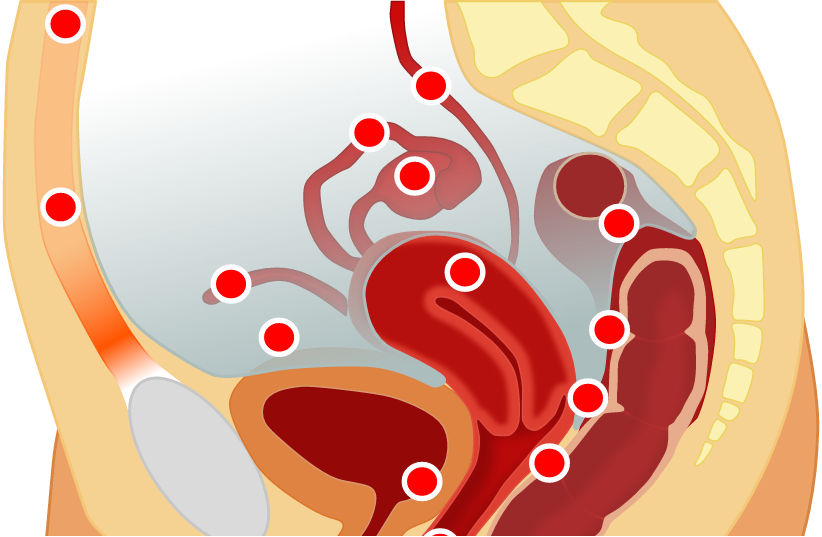March is endometriosis awareness month. This disease, rarely discussed, affects women of childbearing age, and also many other women; one out of 9-to-ten women suffers from it. Endometriosis is characterized by lesions of cells similar to endometrial cells which move to different places in the body outside the uterus. This is a gynecological, inflammatory and chronic disease with many and severe symptoms.
Today, although an increasing number of people and carers know about it, it still takes almost nine years to diagnose the disease, after the patient has already met with several specialists. Endometriosis manifests differently in each woman. The earlier the diagnosis, the easier it will be to treat it, so it’s crucial to diagnose the disease early.
What are the symptoms of Endometriosis?
The disease changes during the menstrual cycle and during life in general, and at each change it will manifest itself in a different way.
Here are some of the symptoms to look out for: fatigue, pelvic pain and other pains in various parts of the body, pain during intercourse, heavy menstrual bleeding and a variety of gastrointestinal disorders, abdominal bloating, frequency and burning when urinating, mood swings and fertility difficulties.

In case of suspected endometriosis, it is recommended to see a specialist or go to a center that specializes in endometriosis, for diagnosis and adjustment of medical treatment.
Due to the nature of the disease, a combination of multi-professional staff could help treat and relieve symptoms.
There is no one answer — there are women who find relief with a proper diet with the help of dietitian, acupuncture, herbs and Chinese medicine, yoga, mindfulness etc. The idea is to choose the most appropriate therapy for you.
What is the relationship between nutrition and endometriosis?
Because endometriosis is inflammatory, dietary advice will usually include an anti-inflammatory diet to slow the progression. Such dietary advice should include reviewing blood tests, eating habits and examining the need for supplements, relieving gastrointestinal symptoms and improving fertility. All while respecting the patient's preferences, her lifestyle and finding the right way to persevere over time.
The anti-inflammatory diet
The role of the anti-inflammatory diet is to reduce inflammation caused by the disease, some foods trigger the inflammation and others will lead to its weakening. Since it is chronic, it is best to stay on an anti-inflammatory diet even during periods when the symptoms are less noticeable.
Principles of a sensible diet with endometriosis:
- Reduction of processed / ultra-processed foods: This is an industrial food to which various additives have been added, such as flavorings, preservatives, emulsifiers, food colors and more. Instead eat simple raw foods such as vegetables, fruits, fish, legumes, whole grains, goat yogurt, greens etc.
- Reducing white sugar, sweets and sugary drinks, and preferring complex carbohydrates with a low glycemic index, depending on tolerance, while addressing digestive problems. Try to reduce eating sweets and choose homemade substitutes such as: dark chocolate bars with tahini / natural peanut butter, almond flour-based pastries, sugar-free nut spreads.
- Gluten Reduction: Gluten is protein found in wheat, barley and rye. Reduce foods that contain this protein such as pasta, breads and pastries, Eat cereals, legumes and starchy vegetables that don’t contain gluten such as: basmati rice, lentils, sweet potatoes, quinoa, edamame, buckwheat and more.
- Reducing foods that contain saturated fat or industrial trans fat. Eat fats from good sources such as various nuts, avocados, olive oil, and tahini according to the tolerance of the digestive system.
- Dairy products are important as a source of calcium and vitamin D, so they’re recommended for eating. You should try products based on goat's milk and avoid drinking cow's milk.
- Eat a variety of fruits and vegetables rich in antioxidants. If possible, avoid pesticides and choose organic products. It’s especially recommended that leafy vegetables be organic or hydroponic.
- Limit alcohol and coffee consumption.
- Consume more foods that contain omega 3 from a living and plant source such as: salmon, tuna, seaweed, chia seeds, flax seeds, canola oil, walnuts.
- Reducing food preservation in plastic containers: Instead of eating from disposable containers and cans, use drinking bottles and food storage containers made of stainless steel or glass.
- Make sure you eat food consciously and slowly.
There are nutritional principles for endometriosis that can’t always be easily applied, so for every woman it’s important to find the most appropriate nutritional principles, guided by a professional and remember that this is a process.. Sometimes only partial application of things will improve feelings and benefit.
